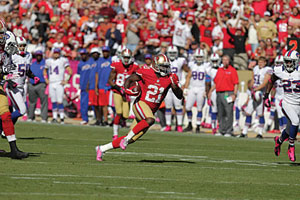I have several big passions. My family, friends, showrooms and sports are way up there on the list.
Living part-time in Northern California, we’ve had a darned good sports year! The San Francisco Giants won the World Series and the 49ers reached the Super Bowl.
I was fortunate to play several sports in high school and college. As I think about how a successful sports team is built, I see a number of similar factors that help build a successful showroom business. Let’s see if any of this makes sense. Since we reached the end of the football season last month, I’ll lean my thoughts in that direction.

|
|
San Francisco 49ers running back Frank Gore. Photo courtesy of the San Francisco 49ers. |
Fundamentals
In football, blocking and tackling are key fundamentals; in basketball dribbling and passing are key elements; in baseball it’s catching, throwing and hitting. In business there also is a list of important fundamentals: developing a showroom business plan, doing an annual budget, generating monthly financial statements, having written job descriptions, doing regular employee performance evaluations, having a written list of showroom best practices and quite a few other things. You can’t get fancy or be successful unless you master the fundamentals.
Recruiting
Colleges, pro teams and probably even some high schools spend a lot of time, energy and money recruiting the best talent they can find. It’s the same for your business. The recruiting and hiring process is a key element of success. People are your most important asset. You will only be as strong and successful as your weakest employee. You must continually work hard to develop the strongest team possible.
Training
Athletes need to train to be in top shape. Once you’ve recruited the best players and you’ve incorporated and coached the fundamentals, you have to train your employees to get ready to sell! To be successful, showroom sales consultants have to be trained well. That includes learning various systems and procedures, knowing everything possible about your products, learning the company’s computer system and learning selling skills (you already know how strongly I feel about this one). Training starts on Day 1 and never ends.
Practice
Once you’ve taught your employees the fundamentals and they are well-trained in all aspects of their positions, they must practice, practice and practice. How well I remember the number of hours of practice I put in for the sports I played. I still ride bicycle a lot and am preparing for another long ride. Even riding a bicycle requires everything I’ve talked about so far. In the showroom you should be practicing selling skills at least once a week. Get together with a teammate and practice meeting and greeting a new client. Do some role playing on qualifying a client. Practice reciting the benefits that will apply to the various features of your products. Remember what our moms and dads and coaches hammered into us, “Practice makes perfect?” Please, (I’m pleading) do the training and then practice what you’ve learned.
Captain
Almost every sports team has a captain. Every showroom should have a manager. For wholesalers, that captain has to be someone who learns and understands the showroom business. It’s a lot different than the wholesale side of things. The captain has to be the leader, the motivator, a great communicator, creative, supportive and involved. He/she also has to be fair, firm and consistent in their management style. A weak captain will most likely mean a weak team.
Fans
These are your clients! Without fans pro sports teams would go away. The fan base dictates success or failure. With no clients your showroom will not succeed. So what do you have to do to make and keep the fans happy? In sports, win. In business it’s offering and delivering the absolute best total value package in your marketplace. That includes: the sales consultant, the captain, quality products, superior service, terrific vendor partners and providing the best buying experience possible. Your challenge is to entice these fans to come into your showroom, give you the opportunity to tell your story, buy from you, deliver more than you promise and not forget them after the (game) sale is over. Love ’em or lose ’em!
Game film
Most sports teams “scout” their competition. They have people watching and analyzing upcoming games of the opponent. In a lot of cases (especially at the pro and top college level) coaches and players will dissect and study film of these games in intimate detail. You should be doing the same thing with your competition. You or someone else should go visit every one of your competitors. See what they do well and not so well and share your “scouting report” with your team. I have written a couple articles on shopping your competition (you can find these in the Supply House Times archives at www.supplyht.com). I developed a “mystery shopping” form you can use to help study your game film. If you’d like a copy, email me.
Get pumped up
I love enthusiasm and always have. Enthusiasm is contagious (both lack of it and having a lot of it). The main item here is motivation. The coach, captain or boss has to take the lead on this. Just watch the start on any big game on TV. The whole team gets together, jumps up and down, yells, slaps each other on the back, etc. You may not want to go that far in the showroom, but staying pumped up leads to success and a more fun, productive environment. Motivations can be as small as a pat on the back, a verbal “thank-you” or “good job,” all the way up to a nice bonus. “Little things mean a lot” should be practiced every day.
Calling signals
In football it’s usually the quarterback or the captain of the defense who makes the calls. In basketball it’s usually the point guard and in baseball it’s the catcher who gives the signal to the pitcher for what pitch to throw. Many of these signals originate from the coach, manager or captain. Let’s call this communicating. This is a skill unto itself. It’s an area too many folks don’t perform well. They either don’t know how, are too busy, don’t feel it’s important or simply just do a lousy job at it. Great communication is one of the most important keys to success on the playing field and in the showroom.
Creative play calling
“My” 49ers have a great running back in Frank Gore, but if all they did was run Frank every play it wouldn’t take the defense long to figure out how to stop him. The 49ers have to let their new, young quarterback throw a long pass every now and again. The team might even do a fake kick to throw its opponent off. You have to do the same thing. Having a unique and creative marketing plan can keep you out in front of your competition. Doing promotions and advertising that draws “fans” to your business (and not the folks down the street) is the goal of your plan. I hate the old phrase “Look outside the box,” but when it comes to marketing I think it fits. Don’t be afraid to throw the long ball.
Timeouts
And don’t be afraid to call a timeout. Get the team together and take a look at where you are, where you want to go and how you’re going to get there. The coach and captain usually take charge of these timeouts, but they need input from the rest of the team. Develop a to-do action list that will lead you to victory.
Terrific fan experience
Pro sports and big colleges go all-out to provide a great experience for their fans with things such as comfortable seating (most of the time), convenient/clean restrooms, wonderful food, shops to buy souvenirs, convenient parking and a lot more. What do you do to make sure your fans have a terrific experience?
Owners
Pro sports teams have a bunch of pretty well-to-do folks that own them. They have invested a lot of money into buying the team, building a stadium or arena, putting up big money for the players, hiring the best coaches and managers, creating a great marketing program to draw fans to the game, etc. They may love the sport they’ve invested in, but the No. 1 reason they’ve invested all this money is to make money!
The owners of your showroom business are no different. They’ve invested a lot of money in building out the showroom, staffing, inventory, marketing and computers. They have done this with just one purpose in mind – to make money and make a good return on investment. The best showroom owners I know have taken the time to learn this exciting, but different business. They have become retailers/wholesalers – not just wholesalers. In the years of writing this column I have seen owners and managers figure out the showroom business can be a great way to earn a nice return on investment. I’m looking forward to seeing more of you do what you have to do to win the showroom game!
Thanks for letting this old sportsman share some passion on two of his favorite subjects, sports and showrooms. Go Giants and 49ers! Go showrooms!



